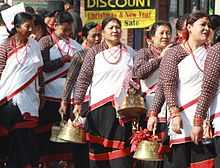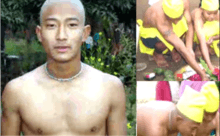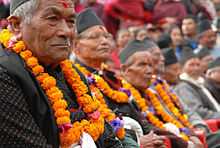Dangol

The Dangol or Dongol (Nepal Bhasa: डंगोल) clan are ethnic Newa people from Kathmandu Valley, predominantly found in Kathmandu, Nepal. They belong to the Jyapu (Nepal Bhasa: ज्यापू:) subcaste within the Newar family and are highly urbanized. In the olden times, they were farmers known for the knowledge on measurement of land and calculation. Also, they have some distinct culture and customs a bit different from other Jyapus, which these days have nearly disappeared through a historical disadvantage in comparison to Hindu castes.

They practice a religion which is a blend of Buddhism, Hinduism and indigenous animism, Their daily life and culture is influenced greater by Buddhism, like Maharjans. They speak a sino-Tibetan language in the Tibeto-Burman branch called Nepal Bhasa (newar). Tibeto-burman speaking people originate from an area near the Yangtze river in China.
Male members of Dangol undergo Keta-puja ceremony (also known as Bratabandha) and female Dangols marry the sun and the fruit 'Bel' when they are young. This is done in order to protect the girl from being a widow, who are looked down upon by the rest of Nepal. If the woman's husband dies, she is still technically married to the sun and can hence not be called a widow.


Dangols belong to Jyapu Community of nepal. Jyapu literally means 'competent worker' in the Nepal Bhasa language. Some of the prominent sub-castes within this group are Maharjan, Suwal, Singh, Prajapati, etc. They have provided significant contribution to Nepali society and have been seen as the backbone of Newar community.During Lichhavi period the Jyapus were prominent in political as well as administrative field of the country.After decline of the Lichhavi dynasty, the ruling elite group of the period could not find any political or administrative occupation, thus forced into farming.[1] Since all the administrative and military jobs were denied to Lichhavis [3] after their defeat,Lichhavis were forced to take occupation that of farmers.This political change caused them to mix with original farmers(Kirat,Ahir) of the kathmandu valley and they were incorporated into jyapu community.[4]
Some Famous political figures

- Sarbottam Dangol (Unified Communist Party of Nepal (Maoist))
- Tirtha Ram Dangol (Nepali Congress)
- Pramila Singh Dangol (Nepali Congress)
- Suman Kaji Dangol (Rastriya Janshakti Party)
- Balkrishna Dangol ‘Bashi’ (Lok Kalayankari Janata Party)
See also
- Newa People
- Newar caste system
- Maharjan
References
- ↑ Babu Ram Acharya-Nepal ko Sanskritik parampara